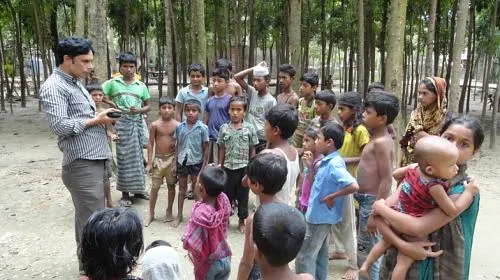(May 20, 2013) UPDATE: Following assessments, CARE emergency teams in Myanmar and Bangladesh found that Cyclone Mahasen caused little damage as it passed over coastal Bangladesh and spared Myanmar almost entirely.
In Myanmar, CARE is working with help ensure the needs of some 100,000 people evacuated from makeshift camps as they return to their pre-cyclone locations and supplying family emergency kits, including plastic sheeting, tarps, hygiene items and water pumps. CARE also is ready to help build adequate temporary shelter and mitigate the risks of future natural disaters on the returnees.
In Bangladesh, one of the most disaster-prone countries in the world, with regular flooding and cyclonic events, CARE continues to work to see that families can prepare and protect themselves from such catastrophes and we are prepared to respond to emergencies when needed.
DHAKA/YANGON (May 16, 2013) – Although Cyclone Mahasen weakened Thursday afternoon into a tropical storm as it passed over coastal Bangladesh and spared Myanmar almost entirely, CARE emergency teams on the ground remain vigilant, and will begin assessing the damage caused on Friday morning.
There have been reports of 18 deaths due to Mahasen in Bangladesh, Myanmar and Sri Lanka. In Bangladesh’s southern Patuakhali coast, there have been reports of more than 500 houses being destroyed, and thousands of people sought shelter after being evacuated ahead of the cyclone.
“Though the damage so far is less than what we feared, we are not out of danger yet. Heavy rains continue and there are risks of land and mudslides; we need to remain vigilant, and continue to monitor the situation. We’ll be assessing the impacted areas immediately after the storm passes to determine a response,” said Alex Maclean, CARE Bangladesh Assistant Country Director.
In Bangladesh, CARE has prepositioned emergency family kits for 20,000 families and food rations for 6,000 families ready for distribution. Emergency family kits include plastic sheeting for shelter, water containers, water purification tablets, soap, cooking pots and utensils.
In neighboring Myanmar, CARE Country Director Brian Agland said response teams would begin assessing people’s needs in Sittwe and further north in Maungdaw and Buthidaung townships.
“Thankfully, Cyclone Mahasen has not turned out to be the major event that was forecast for Myanmar. We will have to wait and see what the assessments reveal, but our teams remain ready to help those who have been hardest hit,” said Agland.
In Myanmar, CARE is ready to distribute emergency family kits and clothing for 20,000 families. CARE is also sending water pumps and other equipment to Rakhine State to assist with pumping out water ponds and clearing debris if required.
Media Contacts:
Atlanta: Brian Feagans, CARE, bfeagans@care.org, +1.404.979.9453, +1.404.457.4644
Atlanta: Nicole Harris, CARE, nharris@care.org, +1.404.979.9503, +1.404.735.0871

